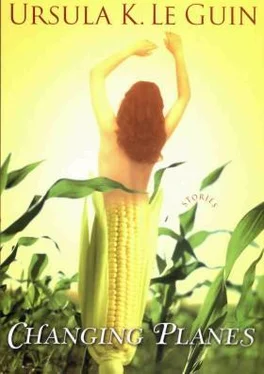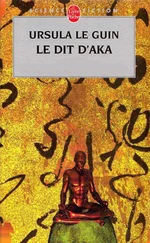The Hoa and Farim had no domestic animals except small terrier-like dogs to keep the huts and granaries free of mice. Their weapons were short bronze swords and long wooden lances, and they carried hide shields. Like Odysseus, they used bow and arrow for sport and for hunting but not in battle. They planted grain and root vegetables in clearings, and moved the village to new planting grounds every five or six years. Women and girls did all the farming, gathering, food preparation, house moving, and other work, which was not called work but “what women do.” The women also did the fishing. Boys snared wood rats and coneys, men hunted the small roan deer of the forest, and old men decided when it was time to plant, when it was time to move the village, and when it was time to send a raid against the enemy.
So many young men were killed in raids that there were not many old men to argue about these matters, and if they did get into an argument about planting or moving, they could always agree to order another raid.
Since the beginning of time things had gone along in this fashion, with raids once or twice a year, both sides celebrating victory. Word of a raid was usually leaked well in advance, and the raiding party sang war songs very loudly as they came; so the battles were fought on the battlefields, the villages were unharmed, and the villagers had only to mourn their fallen heroes and declare their undying hatred of the vile Hoa, or the vile Farim. It was all satisfactory, until the Black Dog appeared.
The Farim got word that Hoa was sending out a large war party. All the Farim warriors stripped naked, seized their swords, lances, and shields, and singing war songs loudly, rushed down the forest trail to the battlefield known as By Bird Creek. There they met the men of the Hoa just running into the clearing, naked, armed with lance, sword, and shield, singing war songs loudly.
But in front of the Hoa came a strange thing: a huge black dog. Its back was as high as a man’s waist, and its head was massive. It ran in leaps and bounds, its eyes gleamed red, foam slathered from its gaping, long-toothed jaws, and it growled hideously. It attacked the war chief of the Farim, jumping straight at his chest. It knocked him down, and even as he tried vainly to stab it with his sword, the dog tore open his throat. This utterly unexpected, untraditional, horrible event bewildered and terrified the Farim, paralysed them. Their war song died away. They barely resisted the assault of the Hoa. Four more Farim men and boys were killed—one of them by the Black Dog—before they fled in panic, scattering through the forest, not stopping to pick up their dead. Such a thing had never happened before. The old men of the Farim therefore had to discuss the matter very deeply before they ordered a retaliatory raid.
Since raids were always victorious, usually months went by, sometimes even a year, before another battle was needed to keep the young men in heroic fettle; but this was different. The Farim had been defeated. Their warriors had had to creep back to the battleground at night, in fear and trembling, to pick up their dead; and they found the bodies defiled by the dog—one man’s ear had been chewed off, and the war chief’s left arm had been eaten, its bones lying about, tooth-marked.
The need of the warriors of the Farim to win a victory was urgent. For three days and nights the old men sang war songs. Then the young men stripped, took up their swords, lances, shields, and ran, grim-faced and singing loudly, down the forest path towards the village of the Hoa.
But even before they got to the first battlefield on that path, bounding towards them on the narrow trail under the trees came the terrible Black Dog. Following it came the warriors of the Hoa, singing loudly.
The warriors of the Farim turned around and ran away without fighting, scattering through the forest.
One by one they straggled into their village, late in the evening. The women did not greet them but set out food for them silently. Their children turned away from them and hid from them in the huts. The old men also stayed in the huts, crying. The warriors lay down, each alone on his sleeping mat, and they too cried.
The women talked in the starlight by the drying racks. “We will all be made slaves,” they said. “Slaves of the vile Hoa. Our children will be slaves.”
No raid, however, came from the Hoa, the next day, or the next. The waiting was very difficult. Old men and young men talked together. They decided that they must raid the Hoa and kill the Black Dog even if they died in the attempt.
They sang the war songs all night long. In the morning, very grim-faced and not singing, they set out, all the warriors of Farim, on the straightest trail to Hoa. They did not run. They walked, steadily.
They looked and looked ahead, down the trail, for the Black Dog to appear, with its red eyes and slathering jaws and gleaming teeth. In dread they looked for it.
And it appeared. But it was not leaping and bounding at them, snarling and growling. It ran out from the trees into the path and stopped a moment looking back at them, silent, with what seemed a grin on its terrible mouth. Then it set off trotting ahead of them.
“It is running from us,” cried Ahu. “It is leading us,” said Yu, the war chief. “Leading us to death,” said young Gim. “To victory!” Yu cried, and began to run, holding his spear aloft.
They were at the Hoa village before the Hoa men realised it was a raid and ran out to meet them, clothed, unready, unarmed. The Black Dog leapt at the first Hoa man, knocked him onto his back, and began tearing at his face and throat. Children and women of the village screamed, some ran away, some seized sticks and tried to attack the attackers, all was confusion, but all of them fled when the Black Dog left his victim and charged at the villagers. The warriors of the Farim followed the Black Dog into the village. There they killed several men and seized two women all in a moment. Then Yu shouted, “Victory!” and all his warriors shouted, “Victory!” and they turned and set off back to Farim, carrying their captives, but not their dead, for they had not lost a man.
The last warrior in line looked back down the trail. The Black Dog was following them. Its mouth dropped white saliva. At Farim they held a victory dance; but it was not a satisfactory victory dance. There were no dead warriors propped up, bloody sword in cold hand, to watch and approve the dancers. The two slaves they had taken sat with their heads bowed and their hands over their eyes, crying. Only the Black Dog watched them, sitting under the trees, grinning. All the little rat dogs of the village hid under the huts. “Soon we will raid Hoa again!” shouted young Gim. “We will follow the Spirit Dog to victory!”
“You will follow me,” said the war chief, Yu. “You will follow our advice,” said the oldest man, Imfa. The women kept the mead jars filled so the men could get drunk, but stayed away from the victory dance, as always. They met together and talked in the starlight by the drying racks.
When the men were all lying around drunk, the two Hoa women who had been captured tried to creep away in the darkness; but the Black Dog stood before them, baring its teeth and growling. They turned back, frightened.
Some of the village women came from the drying racks to meet them, and they began to talk together. The women of the Farim and the Hoa speak the women’s language, which is the same in both tribes, though the men’s language is not.
“Where did this kind of dog come from?” asked Imfa’s Wife.
“We do not know,” the older Hoa woman said. “When our men went out to raid, it appeared running before them, and attacked your warriors. And a second time it did that. So the old men in our village have been feeding it with venison and live coneys and rat dogs, calling it the Victory Spirit. Today it turned on us and gave your men the victory.”
Читать дальше









